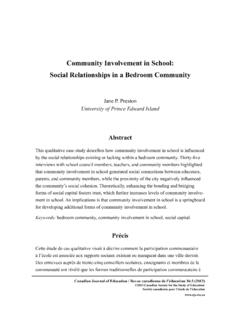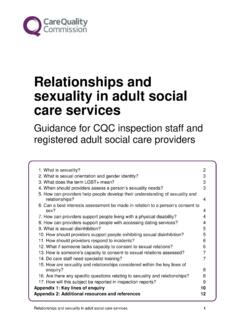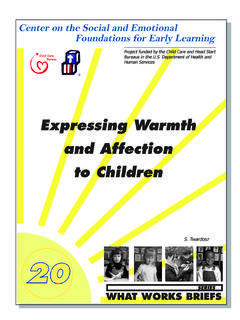Transcription of The Effect of Social-Emotional Competence on Children ...
1 International Education Studies; Vol. 12, No. 12; 2019 ISSN 1913-9020 E-ISSN 1913-9039 Published by Canadian Center of Science and Education 141 The Effect of Social-Emotional Competence on Children Academic Achievement and Behavioral Development Mona Alzahrani1, Manal Alharbi1 & Amani Alodwani1 1 University of South Florida, USA Correspondence: Amani Alodwani, University of South Florida, USA. Received: July 30, 2019 Accepted: September 15, 2019 Online Published: November 29, 2019 URL: Abstract In this paper, we explore the importance of the Social-Emotional Competence on Children s growth.
2 To develop Children Social-Emotional Competence , an interaction between adults and Children is critically needed. Teachers have the responsibility to enhance Children s development in many aspects, including social , emotional, cognitive, academic, and behavioral skills. A positive relationship between teachers and young students helps those students to have better school achievement and behavioral skills. We review several studies that show the influence that social and emotional Competence has on Children s learning outcomes and on their ability to engage in good behaviors.
3 We also provide several strategies that help teachers to build strong and healthy relationships with Children . These strategies foster Children s academic and behavioral success. We define social and emotional learning in relation to school successes to show that Competence in these areas increases students reading, writing, critical thinking, and vocabulary skills. Emotional regulations can also enhance school achievement, both in the present and in the future. Additionally, we provide strategies that teachers can use to foster positive behavioral skills.
4 Keywords: Social-Emotional Competence , teacher-child relationship , behavioural skills, academic achievement, young Children 1. Introduction Take a moment to think about a teacher who had an impact on your life. For most Children , their positive or negative educational experiences affect their development. These experiences affect Children s academic development, behavior, and social and emotional Competence . Thus, in-depth examinations of the teacher-child relationship are essential. In addition, ensuring that these relationships are healthy and strong will help Children to develop Social-Emotional , academic, and behavioral skills.
5 Young Children are very sensitive, so most teachers try to help them to build important social skills. The teacher-child relationship must be examined in depth because many researchers have found strong links between these relationships and the Children s behavior and academic success (Lippard, Paro, Rouse, & Crosby, 2018). Particularly in preschool and kindergarten, this relationship has a big impact on Children s development; this impact lasts well into primary school (Lippard et al., 2018). Lippard et al. (2018) also found that strong teacher-child relationships help Children to develop good behavioral skills and school success, cognitive, social , and emotional skills.
6 To ensure that Children are healthy, adults must support the development of their social and emotional skills, which are of great importance to the Children s education as well. social and emotional skills also help Children to live healthy and safe lives. Children must develop many skills in their early years, including the ability to do the following: communicate with adults, interact with peers in the classroom, form relationships with others, express emotions, self-regulate, show empathy, be motivated, and engage socially. Children need a long time to develop these skills, so teachers must develop Children s social and emotional Competence every day through the use of various activities.
7 A good-healthy relationship between the teacher and the child is also needed in the development of a healthy Social-Emotional Competence . Hence, this paper is meant to show the impact that social and emotional Competence has on Children s academic achievement and behavioral skills). social and Emotional Development social and emotional developments are important to growth in early childhood. These social and emotional skills International Education Studies Vol. 12, No. 12; 2019 142 are associated with the ability to communicate with others in the classroom ( , teachers and peers) and outside of school.
8 social and emotional skills influence how Children interact with others, how they deal with their emotions, and how they react to the events that happen around them. In addition, these social and emotional skills are correlated with the ability to properly express emotions such as happiness, sadness, nervousness, and anger; these skills also help Children determine how to act when they feeling one of these emotions. In addition, Children can learn about their own feelings and identities by practicing social and emotional skills with their peers and teachers. Wu, Hu, Fan, Zhang, and Zhang (2018) defined social and emotional Competence as the use of acceptable behavior to socialize with others and to foster positive interaction.
9 Many teachers are keen to regularly support their students development of social and emotional skills. Lippard et al. (2018) argued that Children are more likely to engage in positive behavior and less likely to misbehave when they grow in class as a result of support from teachers. Lippard et al. (2018) also revealed that, when teachers focus on support, they increase Children s positive outcomes and help them to develop cognitive skills. Similarly, Breeman et al. (2015) indicated that positive teacher-child relationships improve Children s psychosocial abilities and their motivation to communicate in the classroom.
10 On the other hand, negative teacher-child relationships affect Children s behavior and cause them to dislike interacting with their peers in the classroom (Breeman et al., 2015). Breeman et al. (2015) stated that negative communication between peers impacts Children s emotional, social , and behavioral skills. Lippard et al. (2018) mentioned that many scholars have shown the teacher-child relationship to affect all Children in the classroom equally. However, Lippard et al. (2018) also argued that Children can have different experiences when interacting with the same teacher in the same classroom.














